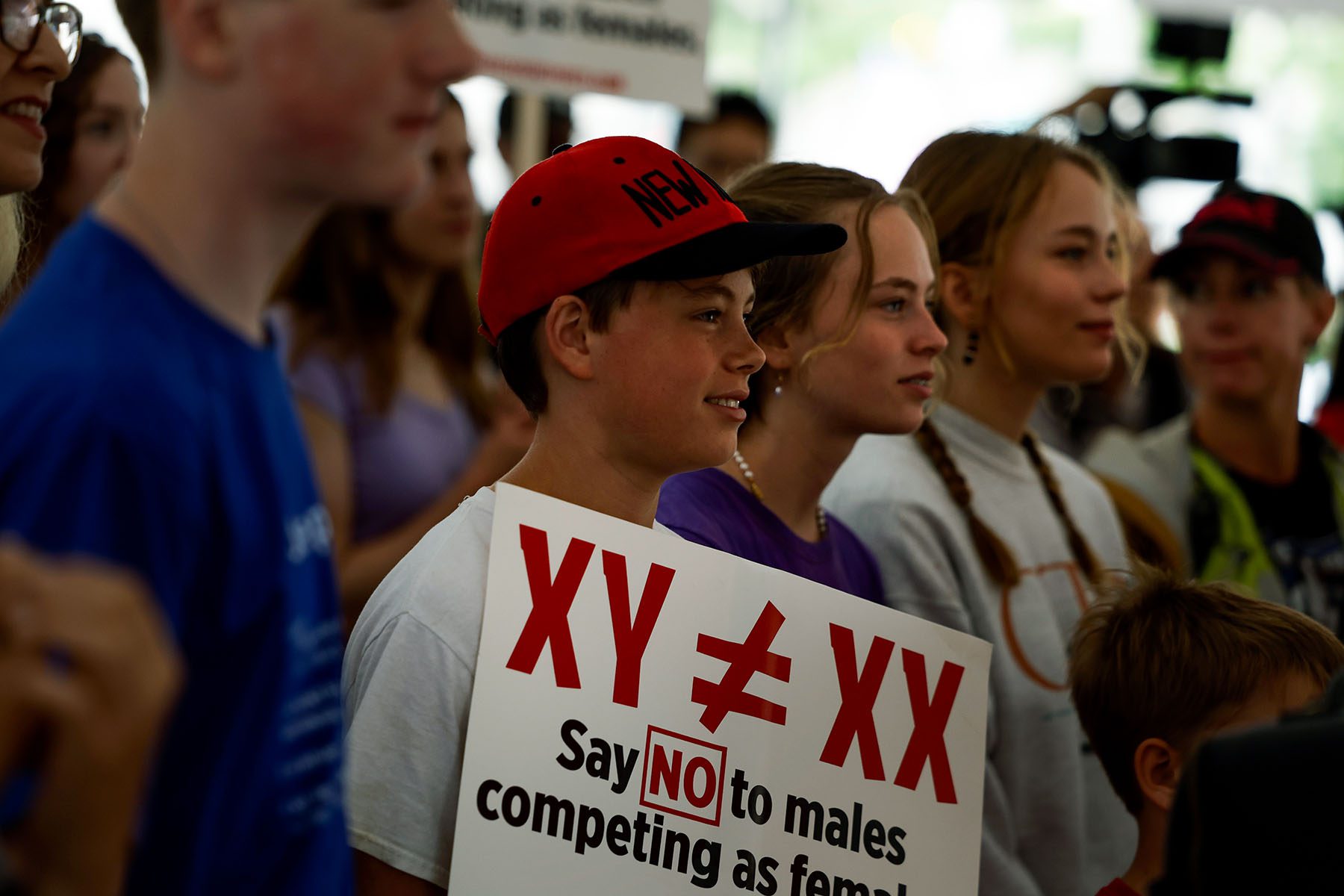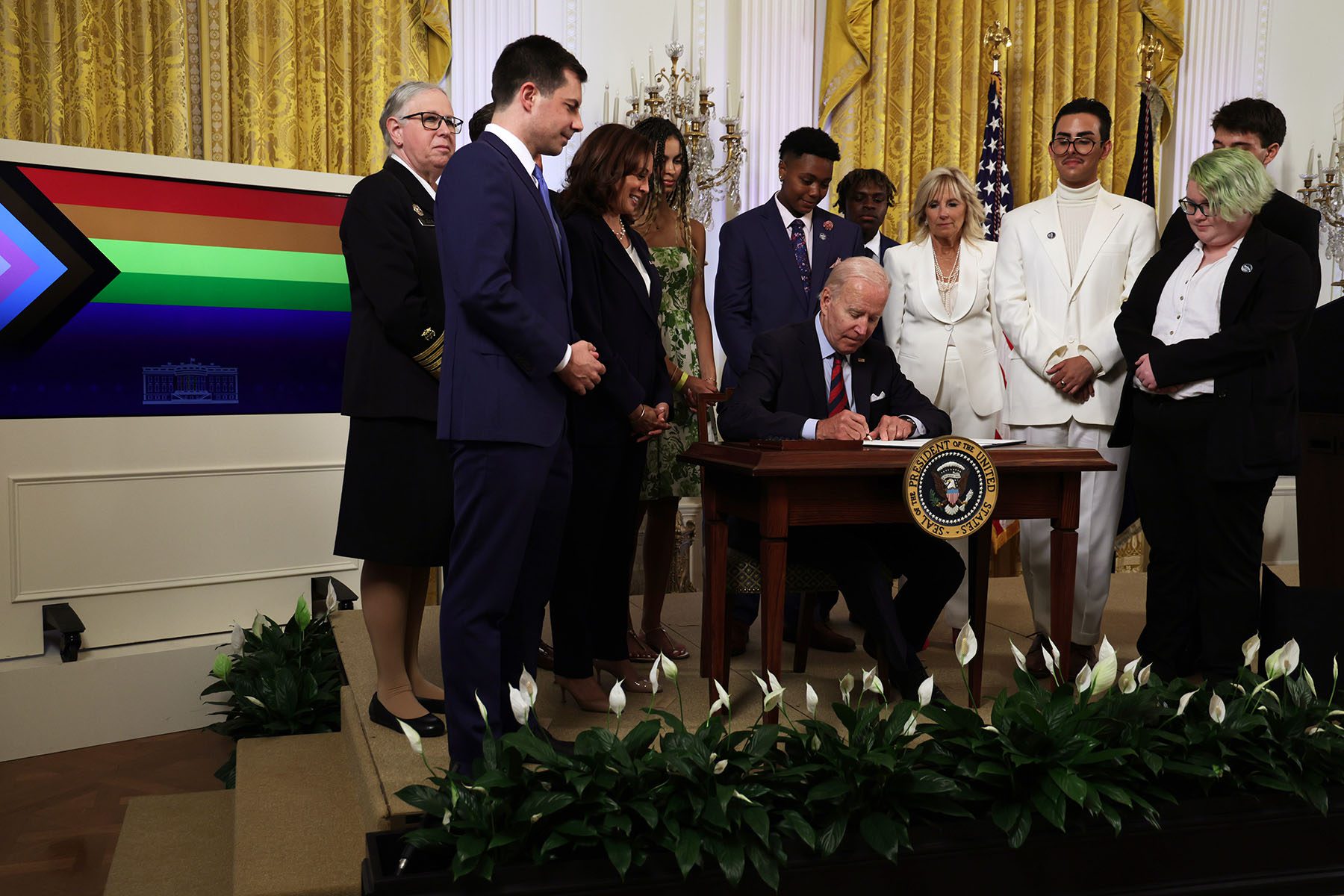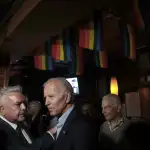For more than a year, as more than 300 anti-LGBTQ+ bills have been introduced into state legislatures and eight states have signed anti-LGBTQ bills into law, LGBTQ+ advocates have been waiting on President Joe Biden.
“In the LGBTQ community, it is clear that our house is on fire,” said Mayra Hidalgo Salazar, deputy executive director of the National LGBTQ Task Force.
Advocates have been asking Biden — often hailed as a champion of LGBTQ+ equality— to put that fire out. But the response to the president’s Pride month executive order has been mixed: Many groups praised it. Others said nothing. A few publicly criticized it, saying it lacked teeth.
During a reception with advocates on June 15, Biden signed the order aimed at curbing LGBTQ+ discrimination. The 13-point plan tasks the Department of Health and Human Services (HHS) with writing model legislation states can use to contrast the anti-LGBTQ+ bills moving through legislatures across the country. It also asks the agency to review whether federally funded programs can be required to stop performing anti-LGBTQ+ conversion therapy, and it establishes working groups to end queer youth homelessness.
Advocates unsatisfied with the administration’s response to rising anti-LGBTQ+ animus in statehouses and beyond — at least three Pride events were targeted this month by extremists threatening violence — say the order doesn’t go far enough. And they question whether Biden is willing to fulfill promises made to queer people on the campaign trail.
“From a big picture perspective, it’s always helpful to have the president of the United States speak out in support of LGBTQ rights,” said Jon Davidson, senior staff attorney at the ACLU LGBTQ & HIV Project. “But if one looks closely at the executive order, it principally directs federal agencies to take steps that I fear will not do much to stem the attacks on trans people that we’ve been seeing.”
Davidson worries that rather than mandating policy changes, the order merely suggests solutions. Under the order, the Federal Trade Commission “is encouraged to consider” if anti-LGBTQ+ conversion therapy amounts to a deceptive labor practice. It directs HHS to “promote expanded access” to LGBTQ+ comprehensive health care.
“‘Consider’ issuing consumer warnings or notices, ‘consider whether to issue guidance,’” Davidson said about the language in the executive order. “It’s not even directing them in most instances to do anything other than ‘consider’ doing something.”
On his first day in office, the president issued another LGBTQ+ executive order outlawing discrimination on the basis of gender identity and sexual orientation. Advocates say that brief order was game-changing in clearly stating that LGBTQ+ people are shielded from sex discrimination.
Harper Jean Tobin, among the nation’s foremost transgender policy experts, called the Pride month order “important” and “more than … expected” but “a lot less than we need.”
“The pieces seeking to respond to state-sponsored discrimination and it’s [sic] impacts could have been much more specific, with clear timelines, and also acknowledged this crisis is inextricably related to rising violent extremism,” Tobin said via text.
Many organizations praised the president. Lambda Legal, the Trevor Project, Freedom for All Americans, the National Center for Lesbian Rights, GLSEN, the National Black Justice Coalition, and Services & Advocacy for GLBT Elders all hailed the executive order as an important step.
“President Biden’s commitment to ensuring dignity, respect, and equality for LGBTQ Americans is more important than ever as members of our community have faced relentless attacks in states across the country this year,” said Brandie Balken, executive director of the national LGBTQ+ rights group Freedom for All Americans, in a statement.
Youth suicide prevention organization the Trevor Project said the order was especially critical because it suggests steps to finally end conversion therapy of queer youth, including exploring guidance on whether federally funded health providers are required to end the practice.
“It’s past time that we put an end to the dangerous and discredited practice of conversion ‘therapy,’ and expand access to the affirming care LGBTQ young people actually need to survive and thrive,” said Amit Paley, the organization’s CEO, in a statement.
Olivia Hunt, policy director for the National Center for Transgender Equality, praised the executive order and noted that her organization is also eager to see final regulations to protect transgender people in Section 1557 of the Affordable Care Act, the nondiscrimination clause gutted by the Trump administration.
In a statement to The 19th, White House Assistant Press Secretary Kevin Munoz said the administration is “pulling every lever to advance LGBTQI+ equality and with the urgency that this moment demands.”

“We know this moment is incredibly challenging for LGBTQI+ individuals in the United States — and we will continue using every authority we have to advance equality and combat discriminatory legislation,” Munoz said, noting that the administration has worked closely with LGBTQ+ groups and recognizes the need for “Washington to do more.”
Among the largest asks from queer advocates has been updated Title IX regulations, which were changed under the Trump administration. While many believe that the rules protect transgender students under “sex discrimination” protections, advocates have been eager to see rules that make those protections explicit.
On Thursday, the administration fulfilled that promise, releasing new regulations to protect LGBTQ+ students from discrimination in education.
Advocates hailed the move as historic and urgent as queer youth continue to face an onslaught of anti-LGBTQ+ bills from coast to coast. It has also been praised as a historic move to include intersex Americans, those born with variations in sex characteristics that don’t fit neatly in the binary of male or female.
“The proposed clarifications to Title IX’s scope would mean much-needed protection for already-marginalized groups of students,” said Maddie Moran, director of communications for the intersex rights group interACT, in a media statement.
“This is a much-needed step in the right direction,” added Lambda Legal senior counsel Paul Castillo in a statement.
-
More from The 19th
- From marriage equality to interracial marriage, Supreme Court conservatives appear divided on handling civil rights after Roe decision
- How clinics in states where you can get an abortion are preparing for ‘a wave of clients’
- This anti-abortion group shapes laws nationwide. Your state may be next.
Even before the June executive order was released, some advocates had been looking to Biden to address issues dating back to the Obama administration. Queer immigration activists have been pleading with the Biden administration to release transgender asylum seekers from detention, arguing that multiple deaths in custody demonstrate that Immigration and Customs Enforcement (ICE) has proven itself unable to house such a vulnerable population. Jennicet Gutiérrez, co-executive director of Familia: Trans Queer Liberation Movement, declined the administration’s Pride reception invitation, citing the continued detention.
“There is no pride in detention,” Gutiérrez said, citing the deaths of two transgender women in detention under the Trump administration and an HIV-positive man under the Biden administration. “The least he could do is release trans people, people living with HIV or any medical condition, and we have a very strong case to say that ICE is not capable of caring for our community.”
The Task Force echoed those sentiments.
“Overturning the violence of the previous administration should be the floor not the ceiling that we’re pushing for as an LGBTQ community,” said Hidalgo Salazar. “What we’re really looking for in this administration are concrete actions that benefit and improve queer people’s daily lives.”
On Wednesday, queer media organization GLAAD released a study that found that 70 percent of LGBTQ+ Americans felt discrimination has been on the rise over the last two years. More than half (54 percent) of trans and nonbinary people said they didn’t feel safe walking in their own neighborhoods. Last year, the transgender homicide rate hit an all-time high of 57 slain.
In the meantime, the Equality Act, legislation that Biden promised would codify nondiscrimination protections nationwide in his first 100 days, has stalled in the Senate along with other priority progressive bills. And the administration has yet to enforce its day one executive order barring gender and sexual orientation discrimination; 18 states now ban transgender kids from playing sports, and three have passed laws blocking trans-affirming health care for minors. In April, the Department of Justice filed a statement of interest in a case challenging an Alabama law that criminalizes transgender care for youth.
Davidson, of the ACLU LGBTQ & HIV Project, notes however, that the administration has grounds to directly sue states passing anti-trans sports and medical laws.
“Those state laws should be considered preempted by federal law,” he said. “They would also have grounds to cut off funding to those schools that are violating Title IX.”
The White House noted that the decision falls under the purview of the Department of Justice, not the White House. The DOJ did not immediately respond to a request to comment for this story.
David Stacy, the Human Rights Campaign’s government affairs director, said he thinks the administration is treading carefully in tricky legal territory, weighing bringing cases in circuits where conservative judges are likely to rule against trans rights.
“We think they are taking this very seriously,” Stacy said. “That’s what the president’s statements have indicated. That’s what the executive orders indicated. … The work that the agencies do is going to matter most, and that’s what we’re watching over time.”







